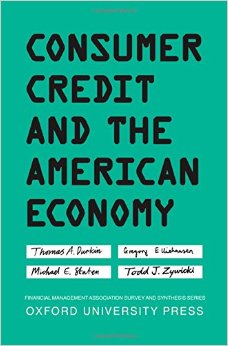Who's Afraid of Consumer Credit? A Discussion with Todd Zywicki
The market for consumer credit has been subjected to an ever increasing amount of federal regulation since the 2008 crisis. The Dodd-Frank Act created the Consumer Financial Protection Bureau to intervene in consumer credit markets and protect us from the rapacious lenders who devour household income and place consumers in unmanageable levels of debt through stealth and manipulative business practices. The predictable results have been a marginal increase in the cost of credit and its decreasing availability to lower income consumers as the CFPB’s rules price them out of this market.
Todd Zywicki, co-author of Consumer Credit and the American Economy, discusses in this podcast that the jejune view of this market articulated by Elizabeth Warren and other progressives isn’t supported by wide-ranging data. What the evidence tells us, Zywicki argues, is that when debt is measured and analyzed on a flow basis, meaning it is paired with consumer’s income streams, it is quite manageable for most households. Simply tallying up levels of consumer debt or overall credit card debt doesn’t give us a true understanding of how consumers are using it. Frequently, however, this stock to stock comparison is used in journalistic and media accounts to support the view that these markets are out of control.
What are the alternatives here? Well, loan-sharking used to be a brisk mafia business, often being their most profitable operation, Zywicki notes. Consider that Richard Nixon at the 1968 Republican National Convention explicitly called for its curtailment. Why? Under a former regime of strict credit controls and usury laws, consumers, many of a low income nature, couldn’t get the credit they needed. They did what they had to do, and that frequently meant turning to less transparent and accountable sources of capital. And of course, while loan sharks frequently stepped-in in former times, many consumers now turn to payday lenders as a needed source of credit in tough circumstances. Is this option somehow superior to credit cards?
What we might consider as a more significant challenge to the widespread use of consumer credit is that even if consumers are managing their debt, are they also building wealth? That is, is debt too easily resorted to instead of saving and investing through a more ascetic consumer lifestyle with the bigger, future payoff one of increased independence from both government and the vagaries of the market?

